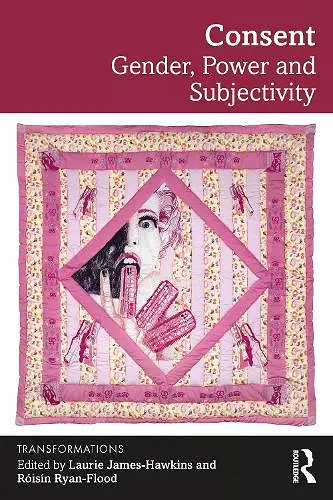Consent
Gender, Power and Subjectivity
Róisín Ryan-Flood editor Laurie James-Hawkins editor
Format:Paperback
Publisher:Taylor & Francis Ltd
Published:30th Nov '23
Currently unavailable, and unfortunately no date known when it will be back
This paperback is available in another edition too:
- Hardback£145.00(9781032415758)

This book considers the concept of consent in different contexts with the aim of exploring the nuances of what consent means to different people and in different situations. While it is generally agreed that consent is a fluid concept, legal and social attempts to explain its meaning often centre on overly simplistic, narrow and binary definitions, viewing consent as something that occurs at a specific point in time.
This book examines the nuances of consent and how it is enacted and re-enacted in different settings (including online spaces) and across time. Consent is most often connected to the idea of sexual assault and is often viewed as a straight-forward concept and one that can be easily explained. Yet there is confusion among the public, as well as among academics and professionals as to what consent truly is and even the degree to which individuals conceptualise and act on their own ideas about consent within their own lives.
Topics covered include: consent in digital and online interactions, consent in education, consent in legal settings and the legal boundaries of consent, and consent in sexual situations including sex under the influence of substances, BDSM, and kinky sex. This book will appeal to students and scholars interested in issues of consent from the social sciences, gender theory, feminist studies, law, psychology, public health, and sexuality studies.
"This book troubles the concept of consent in a wide variety of contexts. Using multiple interdisciplinary perspectives, it offers a significant intervention in the contemporary public and academic conversations on the use of consent.
Focusing on interpersonal relations, institutions, and social structures, from the public toilets in South Korea, to kink and BDSM communities, to workers in the City working long hours, to the law in different nation states, these scholarly approaches work together so that consent also becomes a prism to make sense of regimes of power and their intersection with intimate experience.
Each chapter builds upon and talks to each other unpacking the concept and the often reductive ways consent has been deployed – for example to reproduce intersecting axes of oppression – and ways that it can be extended to support individuals’ and communities’ rights. There are a wide range of methodologies including ethnographic, autoethnographic and theoretical approaches.
This book is politically driven with the aim to intervene in real world contexts. Extremely readable, exciting, and constructed through an ethics of care, this book is a cohesive set of essays showcasing distinctive voices."
Alison Winch, Goldsmiths University of London, UK
ISBN: 9781032415741
Dimensions: unknown
Weight: 400g
324 pages